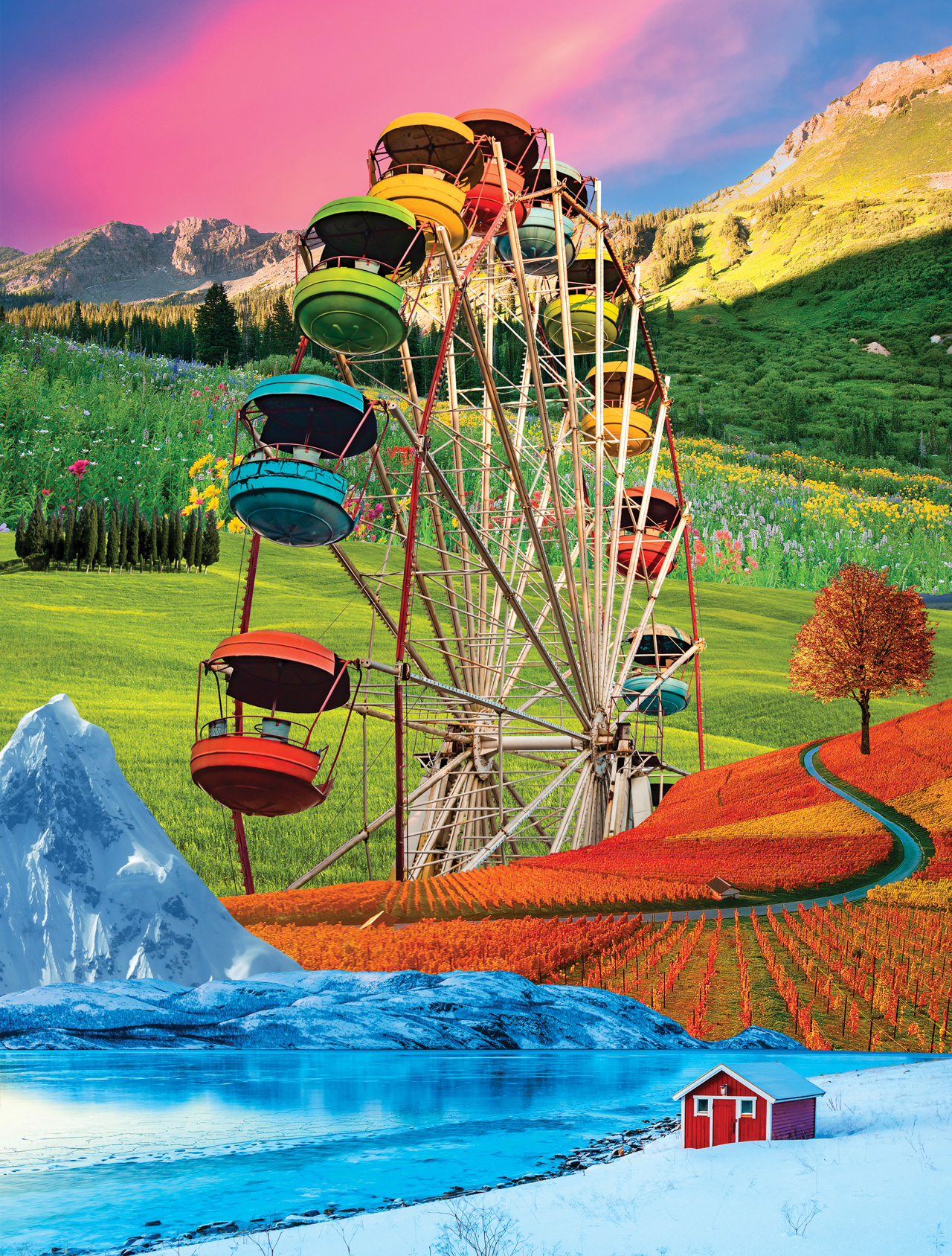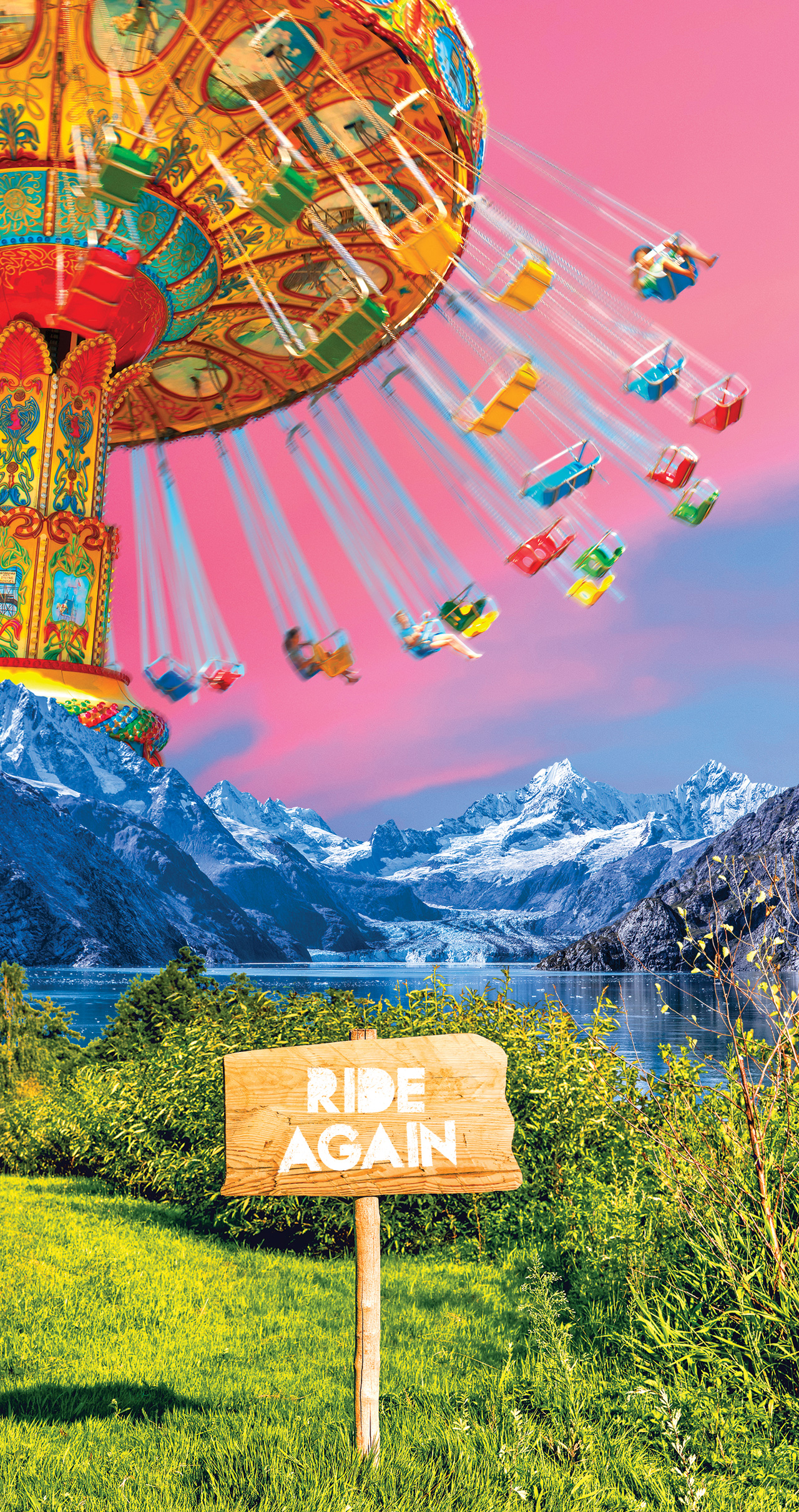Words Divya Venkataraman
Recently, I’ve been followed around by an ambient sense that I’m running late. I’m the White Rabbit in Wonderland, always checking my fat, proverbial watch. It’s not about being actually late for an appointment (even though I usually am – seven minutes at the bare minimum, an infinite ceiling on the maximum). No, this feeling is bound to something else. It’s a stirring more achy and less rooted in cause; more primal and more jarring.
Like every other idea in the course of human history, the notion of time is a mirror – any conception of it will reflect the viewer more sharply than it will the idea itself, which will hulk, blurry in the background. Before the predominance of Judeo-Christian linear time – which conceived of the birth of Jesus and his death as a canonical event, never to be repeated again – other religions took a cyclical view of history, both cosmic and human. It was the dominant mode of thought among the Hindus, Greeks and the Aztecs. But afterwards, linearity prevailed. We are slaves to it, this idea that time will go on and go forward, and never fall back on itself.
That, though, affects not just how we are – but who we are. Our identities are linked to the expectation of progress, to the constant pursuit of forward motion and dynamism, on and on and on. Only forward, never back. Is this why many of us feel a little like we’re behind on something we can’t quite get a hold of?
The modern conception of life as a series of stages really only began at the start of the 20th century. Compartmentalised phases were christened and codified, moving from the binary of adulthood and childhood to allow for shades in between, encompassing adolescence, midlife, retirement, and old age. In 1976, Gail Sheehy’s Passages entrenched these ideas, tying certain milestones – like moving out from one’s childhood home, marriage and having one’s own children – to certain years. Passing through them, collecting accomplishments, was like receiving a little approving tick from the universe. You’re doing it right.
But the world is a different place than it was then, and traditional goalposts of ‘success’ have shifted. Marriage often happens later, if at all. In 1980, the average American man was married at 25 and the woman at 22. In 2023, the average age for a groom is 30, while brides are 28. Child-bearing has also transformed, with more options available to people who want to get pregnant later in life. All the while, for many younger adults in Western cities, the prospect of home ownership feels optimistic at best, and a cruelly dangling carrot at the worst.

Twentieth-century psychologist Michael Mahoney explains the idea of the ‘myth of arrival’ in his book Constructive Psychotherapy.
“Embedded in the myth of arrival… is the message that… there will come a day when our struggles and suffering will be finished,” he writes. “Depression, anxiety, anger, and all manner of ‘ill being’ will finally end. We will wake up one morning and clearly recognise that we have ‘arrived’: We will have gotten ourselves and our lives ‘together’ in a way that can never be undone. We will be healthy and happy. We’ll be in the job, the home, and the relationship that we have always wanted, financially comfortable and fundamentally at peace with ourselves.”
Mahoney’s point is, of course, that human beings are always in a state of becoming, and that the idea of ‘arrival’ is an illusion. Are we not always arriving, always striving? He draws on Samuel Beckett’s existential masterwork, Waiting For Godot, to make his point. Vladimir and Estragon run through their life’s trials and problems, all the while waiting for something – ‘Godot’ – that never comes. There is no end point.
Jenny Odell, the author of How To Do Nothing, proposes an alternate way to approach our lives. Odell advocates for a slow and deliberate exercising of self from the machine of progress and productivity – by diverting attention, most crucially, from the obligations of technology, consumerism, and even ‘self-care’. Her antidote for the modern world is presence.
“Every time I see or hear an unusual bird, time stops, and later I wonder where I was, just as wandering some unexpected secret passageway can feel like dropping out of linear time,” she writes. “Even if brief or momentary, these places and moments are retreats, and like longer retreats, they affect the way we see everyday life when we do come back to it.”
“Looking at life as a series of seasons empowers us to embrace the temporality of each phase, and it offers solace,” agrees Sydney-based counsellor and private practice founder Geetu Vanjani.
“Whereas seeing life as a linear progression can instil fear within – if I don’t do this now, have I missed my chance?”
In her book Wintering: The Power of Rest and Retreat in Difficult Times, author Katherine May also considers the prospect of time, and the cruciality of rest and presence. She recounts a period of hardship – an illness in the family – after which she drew away from the pressure of constant productivity and instead chose to embark on her own ‘fallow season’. She takes inspiration from nature’s ability to cope with the hard times, its undying faith in renewal after loss. Nature, after all, cannot sustain constant growth. It would buckle under it. May’s point also underscores also why we can’t meaningfully talk about sustainability in industries around the world – fashion, transport – without talking about slowing down, pulling back, and doing less. Growth, in the forms that we’re used to it, is at odds with life.

As Odell says: “In the context of health and ecology, things that grow unchecked are often considered parasitic or cancerous. Yet we inhabit a culture that privileges novelty and growth over the cyclical and the regenerative. Our very idea of productivity is premised on the idea of producing something new, whereas we do not tend to see maintenance and care as productive in the same way.”
Vanjani believes that while this generation has grown up in tumult, in the shadow of compounding economic and ecological crisis, the obsession with progress is a part of the broader human condition.
“I think the generations that have preceded us, and the ones to come will continue to feel the pressures of this phenomenon,” she says. She also points to the fact, though, that the ability to compare and share our own successes and ‘milestones’ – every Instagram post is a sun-drenched holiday carousel or a self-deprecating announcement of a career achievement; Facebook has turned from a social platform into essentially a births, deaths and marriages register – has made us experience time differently.
“Each generation has forged their way out of these constraints – whether that has been quietly within their own homes or more publicly,” she says.
Taking a more cyclical approach to time, though, not only allows for rest and reflection on the grey areas of life. It also allows room for tumbles and regrowth, for hurdles, side-steps and interludes to dance in the rain. It does not require that life will only continue to be better, and better, and never stop getting better. This is, after all, a co-opting of the logic of capitalism and of constant growth, which inevitably falters when applying it to our actual selves (which are so much more than profit-making machines).
We relish in the seasons, and we let them continue on, knowing that to feel the sun on our faces means a whole lot more once we’ve known what it’s like to bunker down with mead in the cold. We watch the moon turn from a sliver to a toothy smile to a globe, and we let it, knowing that tomorrow’s night will be brighter until it becomes darker once more. Should we not give ourselves the freedom to wax and wane, too?
Maybe I’m running right on time, after all. Maybe you are, too. Maybe we can be content in accepting that there’s no such thing.
this feature IS PUBLISHED IN THE 7TH EDITION OF GRAZIA MIDDLE EAST ORDER YOUR COPY HERE.









